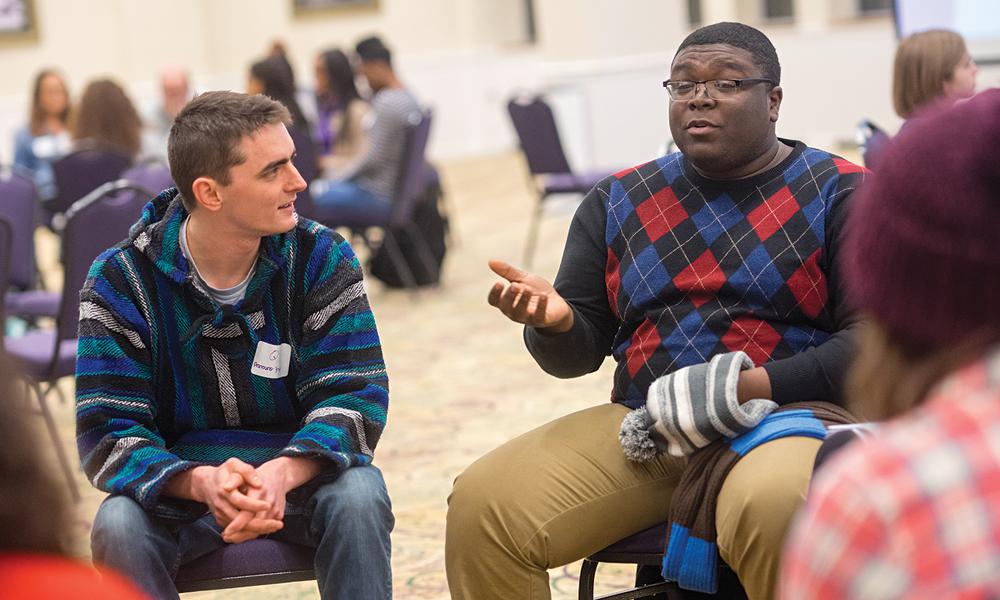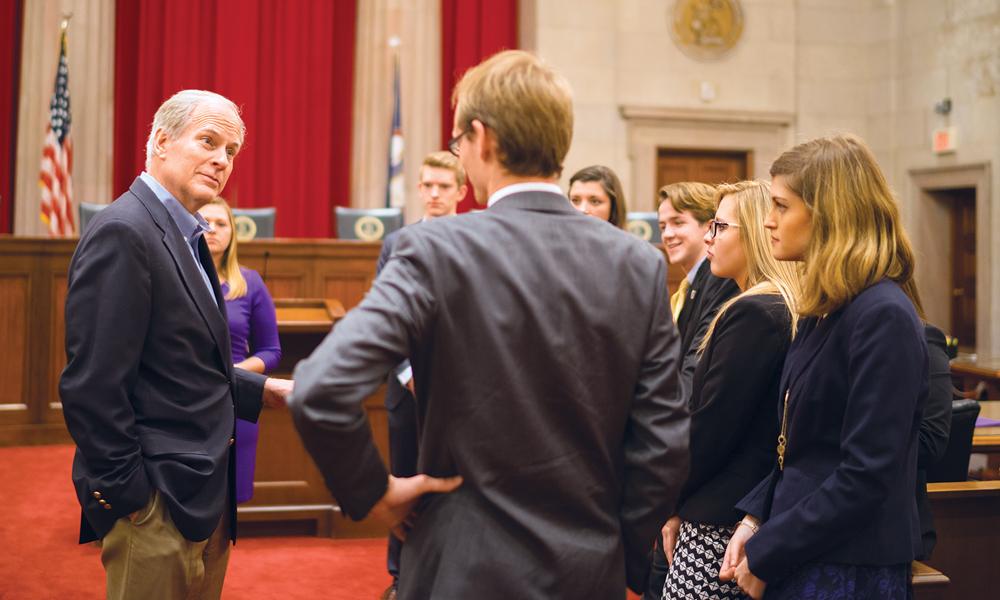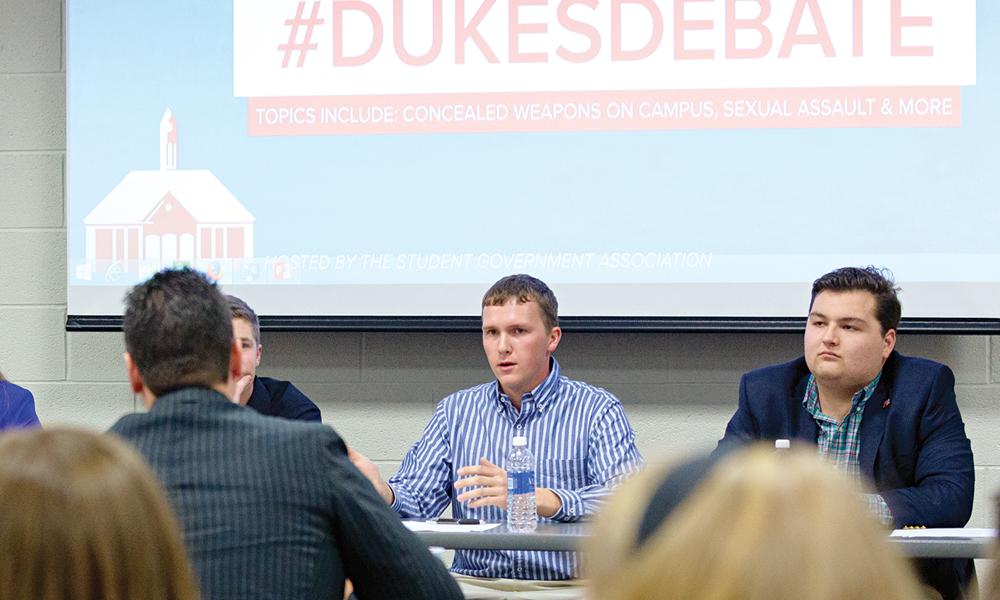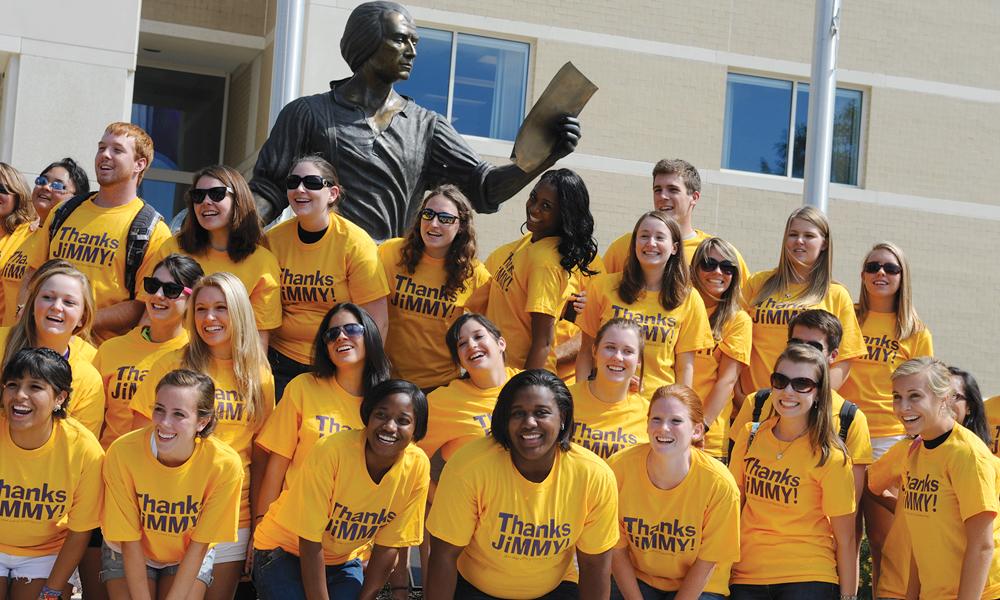Can it be saved?
Nation and World
SUMMARY: Civil society is in desperate need of renewal. As the institution named for the Father of the Constitution, JMU is poised to assume a leading role in the battle to preserve our democracy.
from the Spring-Summer 2018 issue of Madison
By Abraham Goldberg, executive director, James Madison Center for Civic Engagement
A mass withdrawal from civil society was a signature feature of American life in the mid-to-late 20th century. Robert Putnam famously chronicled downward trends in various types of political activity, participation in civic organizations like PTAs and the League of Women Voters, and regular attendance at religious institutions—which often serve as social outlets as well as houses of worship. Over the years, Americans were increasingly less likely to work with others to solve community problems and even spent less meaningful time with friends, family and neighbors. A report by the National Conference on Citizenship recently characterized these trends as a “collapse of American civic life” and further addressed the dilapidated trust Americans have in government and each other.
What has emerged in the 21st century is a polarized, uninviting, and sometimes abrasive society. The Higher Education Research Institute found first-year students in the Fall 2016 semester to hold the distinction of being “the most polarized cohort in the 51-year history of the Freshman Survey” across 184 colleges and universities. Perhaps more troubling is how people view those with different political perspectives. The Pew Research Center found exceedingly high percentages of Republicans and Democrats accusing each other of being “more close-minded than other Americans,” and over half of those politically engaged reported being angry and even afraid of the opposing political party. Underlying this research are millions of conversations devolving into shouting matches and interpersonal relationships strained by political disagreements.
 |
| Students discuss important topics at a D.E.E.P. Impact Dialogue during Martin Luther King Jr. Week. |
This is the political environment our students are inheriting. And, it is in this context that the very institutions charged with training young people to responsibly participate in civic life have been accused of shirking responsibilities. Former U.S. Supreme Court Justice Sandra Day O’Connor has been a leading critic of modern K-12 education practices, arguing “[h]igh-quality civic learning used to be a staple of every state’s education system, but today many have pushed it aside to make more room for math, science, and language arts instruction. This has created a civic education and engagement crisis among our young people. Simply put, they do not know the underlying principles of American democracy.” Similar accusations have been leveled against higher education, most notably in the Association of American Colleges and Universities’ A Crucible Moment, which argued “a robust approach to civic learning is provided to only a minority of students, limiting higher education’s potential civic impact.”
Failing to prepare students to address contemporary public issues in a democratic society while earning an undergraduate degree simultaneously fails our political system and the students themselves. Modern problems require the collective wisdom and values of a public-spirited citizenry, and students hungry for influence and empowerment must learn how to address the issues they care about most. Civil society is in desperate need of renewal, and James Madison University is poised to assume national leadership in the arduous battle to revive our democracy.
 |
| Virginia Supreme Court Justice William C. Mims listens as SGA students present their views during a day of lobbying in Richmond. |
Our vision of being the national model for the engaged university blazes a clear path to being a recognized leader in renewing civil society. We define civic engagement as advancing the legacy of James Madison, the Father of the Constitution, by preparing individuals to be active and responsible participants in a representative democracy dedicated to the common good. Civic learning at JMU is a campus-wide endeavor, rather than a discrete program targeting a select group of students. We believe all students—regardless of their chosen major or their political beliefs—should graduate with the civic knowledge, skills and dispositions that prepare them to effectively engage contemporary problems in a way that values, rather than demonizes, the contributions and perspectives of those who disagree. JMU students are learning how to engage our democratic political system while being charged and empowered to improve it!
|
We believe all students—regardless of their chosen major or their political beliefs—should graduate with the civic knowledge, skills and dispositions that prepare them to effectively engage contemporary problems in a way that values, rather than demonizes, the contributions and perspectives of those who disagree. |
Through our General Education program, all JMU students learn the history and operation of American democratic institutions and intellectual concepts that structure American political activity. Surely, studying our founding documents and building civic knowledge is a prerequisite for meaningful democratic engagement; however, we confront an era in which only 26 percent of American adults can correctly name the three branches of government, and over one-third are unable to name a single right guaranteed in the First Amendment of the Constitution, according to the Annenberg Constitution Day Civics Survey. Learning from the founding documents is prioritized by the highest levels of JMU’s administration. Each year, a speaker in President Alger’s Madison Vision Series delivers a Constitution Day address and challenges our campus community to connect modern issues to the ideas and debates confronting James Madison and his contemporaries when building the framework for our new nation.
Civic learning is reinforced in upper-level courses across the curriculum, providing opportunities for students to connect contemporary problems to the specialized training and development that occurs within academic majors. JMU’s nursing and social work programs earned national attention this year for the ways civic learning is interwoven throughout their curricula; art majors learn how creative expression operates within, and sometimes challenges, dominant political and social orders; business law majors participate in mock trials focusing on white-collar crimes; geographic science students learn how to address problems with a spatial component by studying voting patterns in American elections and creating 2020 campaign strategies; the Honors College identifies civic engagement as an area of curricular emphasis; theater students excel in using performance to raise awareness of public issues; and the School of Media Arts and Design is building programs focused on media literacy and democracy.
 |
| Civil debate is a tradition at JMU. |
Improving appreciations of diverse perspectives and conflict resolution are points of emphasis. Students in communication studies receive formal training in facilitating dialogue among those who disagree on various local and national issues. This is remarkable in an era when conversations about political matters are off-limits in many living rooms and social settings, thus inhibiting opportunities to practice listening to various perspectives and demystify opposing views. Further, faculty from all disciplines have opportunities to learn how to incorporate debate into their courses as a means to develop skills in public advocacy.
Civic learning and democratic engagement are featured in our academic programs, but JMU has long understood that student learning also occurs outside the classroom. The Student Government Association and a host of other student organizations collaborate to support JMU’s voter registration and election participation initiative—aptly named Dukes Vote. Efforts are underway to make voter education a year-round, co-curricular endeavor, rather than a seasonal activity that becomes dormant after each election. Civic learning is further embedded in JMU’s Community Service-Learning program, where students reflect upon the social, cultural and political issues that frame the problems addressed through active service. And, the Center for Multicultural Student Services conducts dialogues on issues ranging from social justice to human trafficking.
|
Civic learning and democratic engagement require exploration of realities that might challenge otherwise comfortable assumptions. They force people to think through serious social, political and cultural issues. |
Perhaps the most significant asset in JMU’s efforts to be the national model for the engaged university is our strong sense of community. At JMU, people care about the well-being of others. Our strategic plan notes “[s]tudents often describe their experience as one where we ‘hold the door open’ for each other. We see this as both literal—reflecting a warm and welcoming community—and figurative, where we open opportunities for our students by fostering the cultivation of ideas in and beyond the classroom.” Caring about others is not only a moral obligation; it also creates an environment that allows students to grapple with contemporary issues in a supportive environment. Civic learning and democratic engagement require exploration of realities that might challenge otherwise comfortable assumptions. They force people to think through serious social, political and cultural issues—many of which are controversial and perhaps even divisive. Although admittedly daunting, preparing students to be active and responsible citizens is made easier because the forces that create political differences are far weaker than the forces that unite us around being a member of the JMU community.
 |
| Constitution Day T-shirts are a big hit. |
James Madison University’s commitment to renewing civil society advances the legacy of our namesake. A small, visionary group of JMU faculty, along with colleagues from Montpelier, have developed the Legacy Framework—six affirmative statements inspired by the knowledge, skills and dispositions associated with the historic James Madison. This framework reflects JMU’s civic mission and guides our campus-wide effort.
- I learn from and with others.
- I foster collaboration.
- I embrace complexity.
- I value pragmatism.
- I advance the public good.
- I lead.
These statements are preceded by a preamble recognizing the challenge of aspiring to be Madisonian while recognizing his lived contradictions: In presenting James Madison as a political role model, it is recognized he exhibited many traits desperately needed today. At the same time, we refuse to idealize him; he had numerous flaws and foibles, and his legacy, like our nation’s, is mixed. We admit to a candid world that we, the people of the United States, are still evolving, still striving toward that perfect union. Looking ahead, we ask, what can each person do to secure the great nation he imagined. James Madison University is advancing this work by preparing students for active and responsible participation in a representative democracy.
